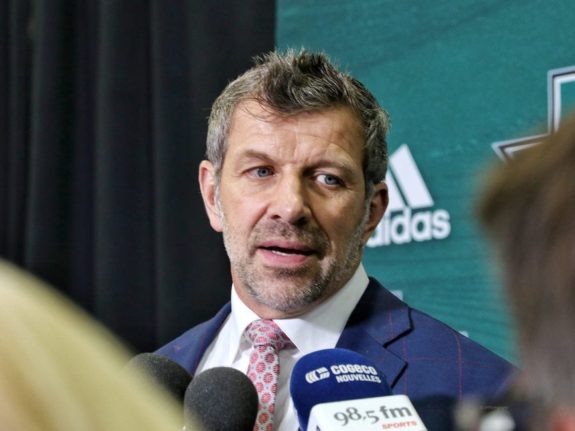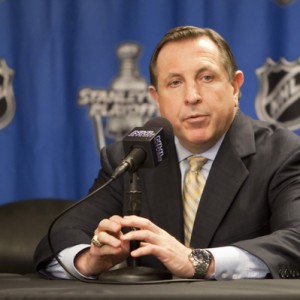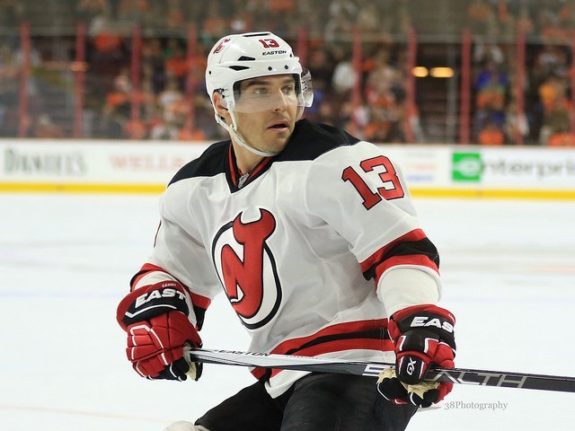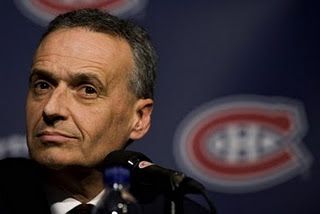In this first installment of a four-part series, originally published in 2018, comparing Montreal Canadiens general manager Marc Bergevin to his four immediate predecessors, we take a look at Pierre Gauthier.
It’s been over 25 years since the Habs last won the Stanley Cup. In that time, players have come and gone, but so have GMs. Five have been hired since Serge Savard was let go in 1995. Only four have followed him out the door though, with Bergevin being the sole exception… for now. How do they each stack up against Savard? Not well, it turns out. So, we’ll settle for comparing Bergevin to the other four who have failed to fill the former’s shoes, starting with Gauthier.

Tale of the Tape: Bergevin vs. Gauthier
Time Served: Feb. 8, 2010 – March 29, 2012 (Gauthier); May 2, 2012 – now (Bergevin)
No. of Playoff Appearances/ Seasons: 2/3 (Gauthier); 4/7(Bergevin)
No. of Division Titles/ Seasons: 0/3 (Gauthier); 3/7 (Bergevin)
No. of Playoff Rounds Won/ Seasons: 2/3 (Gauthier); 3/7 (Bergevin)
No. of Draft Home Runs/ Picks (a home run being a projected good, long-term fit):
- 1/12 (Gauthier; Brendan Gallagher at No. 147 in 2010)
- 3/ 50 (Bergevin, excluding last draft; Artturi Lehkonen at No. 55 in 2013, Victor Mete at No. 100 in 2016, Jesperi Kotkaniemi at No. 3 in 2018)
Best/ Worst Free Agents Signed (based on contract and expected/ actual contributions):
- Erik Cole/ Peter Budaj (Gauthier)
- Alexander Radulov/ Karl Alzner (Bergevin)
Best/ Worst Free-Agent Re-Signings:
- David Desharnais ($1.7 million over two years)/ Josh Gorges ($23.4 million over six years) (Gauthier)
- Max Pacioretty ($27 million over six years)/ Carey Price ($84 million over eight years) (Bergevin)
Signature Trade:
- Michael Cammalleri, Karri Ramo, 2012 fifth-round pick for Rene Bourque, Patrick Holland, 2013 second-round pick (Gauthier)
- P.K. Subban for Shea Weber (Bergevin)
Bergevin and Gauthier Mirror Images
In many ways, Bergevin is the mirror image of his predecessor, Gauthier, as Canadiens GM.
For example, whereas Gauthier had been nicknamed Ghost for the disappearing act he regularly pulled when it came time to speak to the media, Bergevin is just the opposite. To his credit, Bergevin has rarely shied away from attention and has delivered many an impressive sound bite in the process.
Secondly, whereas Bergevin had no prior experience as a GM before getting hired, Gauthier had previously served in that capacity with the Ottawa Senators and Anaheim Ducks. Granted, that experience didn’t exactly serve him well, as, after being hired in February 2010, he lasted just two more seasons.
Contrast that with the seven seasons Bergevin has had to turn this team into a winner and it becomes clear: Time spent in a given position is not necessarily a good indication of success.

That isn’t to say Gauthier was a great GM. Nothing could be further from the truth, especially behind the scenes. He threw assistant coach Perry Pearn under the bus as if to send a warning shot across then-head coach Jacques Martin’s port bow. It was a miscalculation and he ended up firing Martin himself just a few months later.
He then managed to screw up hiring an interim head coach when performance expectations were already low during a miserable 2011-12 season. After hiring Randy Cunneyworth, he bungled the situation by first implying his status as an Anglophone head coach, even in the interim, wasn’t a big deal. He was then forced to backtrack as a result of the public uproar that ensued.
Unofficially having fired Cunneyworth as a result, months before the Habs actually handed the coach his walking papers, Gauthier effectively scapegoated three separate bench bosses in span of literally just as many months. In a poetic twist of fate, Gauthier actually got shown the door himself at the end of that season, before Cunneyworth.
Bad Enough for Gauthier, Not Bergevin
In any case, that 28th-place finish opened the door for Bergevin to be hired, which is all the more relevant now considering Bergevin’s Habs finished in the same location in the standings in 2017-18. Somehow finishing in 28th place was bad enough for Gauthier to be fired, but not bad enough for Bergevin, who was kept on in his current role for the time being… despite the team now having missed the playoffs in three of the last four seasons.
Say what you want about Gauthier. At least the teams he helped put together, including as the assistant of predecessor Bob Gainey, found some measure of sustained success prior to that disappointing 2011-12 season.
In fact, you can make a case that 2011-12 season was an aberration. After all, they reached the Eastern Conference Final in 2010, albeit on the strength of otherworldly goaltending from Jaroslav Halak. They then took the eventual-Stanley Cup-champion Boston Bruins to overtime in Game 7 of the following postseason’s first round.

Meanwhile, in Bergevin’s first season, much the same roster, excluding additions like Michael Ryder (for Erik Cole) and Brandon Prust, rebounded to win the Northeast Division. The year after, again, with the same core that had been assembled by Gauthier and Gainey (excluding the at-times-disappointing acquisition of Thomas Vanek), the Habs reached the Eastern Conference Final once more.
Maybe the Bergevin hiring prompted some sort of seismic culture shock in the dressing room and in that respect it was justified. So, Bergevin, who has yet to meet a synonym for “character” he didn’t like and has preached the need for intangibles on his team (because, for all intents and purposes, this is his team now), was just what the doctor had ordered, at least for a period of time.
Cammalleri Trade Revisited
Bergevin’s proponents may have a good argument too… were it not for the whole fiasco surrounding Michael Cammalleri, who got traded by Gauthier in the middle of a game. The reason? Arguably a bad attitude. Cammalleri made the mistake of speaking out of turn, saying: “We prepare for our games like losers. We play like losers. So, it’s no wonder why we lose.”
So, in many respects, Gauthier was just as much of a stickler for players staying in line as Bergevin. It’s hard to give either one too much credit for sticking to their guns as far as the skill-versus-strength of character debate goes though, considering how their respective tenures turned out.
The only real difference is the amount of time they each got at the helm of the Habs. We’ll never know if Gauthier would have been able to turn it around. It remains to be seen if Bergevin can. Even if things aren’t quite so bleak following a 96-point season, the Habs still missed the playoffs (again) in 2018-19.

That Cammalleri trade will probably stand out as Gauthier’s signature deal, with the Halak one with the St. Louis Blues (for Lars Eller) being a close second. Of course, in retrospect, critics of that deal have to admit sticking with Carey Price in spite of Halak’s heroics during the 2010 playoffs was the right move.
Similarly, Bergevin may have felt forced into trading a Habs playoff hero of his own in P.K. Subban. Dissimilarly, that trade doesn’t look all that good in hindsight as, on Bergevin’s watch, the Canadiens seem intent on slowly moving further and further away from relevance during an era in which success is built on speed.

So, it turns out, Bergevin and Gauthier have at least one thing in common: They both failed spectacularly… just in different ways. Gauthier burned out in a short period of time. Bergevin’s arguably taking his time, given a great deal of slack by owner Geoff Molson.
As evidenced by how quickly the Habs rebounded following Gauthier’s dismissal with minimal damage having been done, his legacy may not end up quite as tarnished as Bergevin’s when all is said and done.
The question is when will that be? The Canadiens are about due… either for a front-office shake-up or another patented Bergevin blockbuster. The preference between the two should be clear.